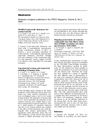2 citations,
March 2022 in “Indian Journal of Psychiatry/Indian journal of psychiatry” The conclusion is that careful management of both psychiatric and skin conditions is crucial for HIV patients, using medication and interdisciplinary approaches.
 2 citations,
May 2017 in “Archives of Plastic Surgery”
2 citations,
May 2017 in “Archives of Plastic Surgery” The document concludes that understanding the evolution of the human face helps cosmetic surgeons meet aesthetic desires.
 1 citations,
May 2023 in “Scientific Reports”
1 citations,
May 2023 in “Scientific Reports” Most hospitalized COVID-19 survivors in the study experienced long-term symptoms, affecting their daily life and mental functions.
 1 citations,
October 2022 in “Sci”
1 citations,
October 2022 in “Sci” Helmets used in acupuncture and light therapy can affect brain blood flow, hair growth, and may improve brain diseases and cognitive functions.
 1 citations,
September 2022 in “Journal of Medical Case Reports”
1 citations,
September 2022 in “Journal of Medical Case Reports” Rehabilitation therapy helped a severe COVID-19 patient regain muscle mass and return to normal life.
 1 citations,
August 2022 in “JAMMI”
1 citations,
August 2022 in “JAMMI” Some people still have COVID-19 symptoms after 90 days, especially older patients and those with severe initial symptoms, but most return to normal.

The study concludes that long COVID recovery involves time, various treatments, and a strong patient-provider relationship.
 January 2023 in “International Journal of Molecular Sciences”
January 2023 in “International Journal of Molecular Sciences” Maxillariinae orchids contain 62 compounds with potential health benefits, including treating skin conditions and diseases like cancer and diabetes.
 September 2022 in “Research, Society and Development”
September 2022 in “Research, Society and Development” Long-lasting symptoms like fatigue and breathlessness can persist after COVID-19, requiring ongoing medical follow-up.

A man wrongly believed he had parasites, showing that delusional infestation can affect men and is often linked with other psychiatric issues, but can be treated with antipsychotics.
 34 citations,
April 1973 in “The American journal of clinical nutrition”
34 citations,
April 1973 in “The American journal of clinical nutrition” Not enough vitamin B6 in pregnant rats' diets caused poor development and health in their babies.
 3 citations,
September 2005 in “International Journal of Cosmetic Science”
3 citations,
September 2005 in “International Journal of Cosmetic Science” Different oils penetrate hair differently; monounsaturated oils like olive oil penetrate better than polyunsaturated oils.










